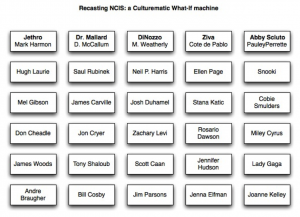This video by Ingrid Michaelson, called Girls Chase Boys, uses this video by Robert Palmer called Simply Irresistible.
If intellectual arbitrage is the movement of meanings or models from one academic field to another, cultural arbitrage is the movement of meanings or models from one part of culture to another.
So Michaelson moves the theme, the meme, the dream out of Palmer and uses it for new purposes. Men become sexual objects (where before it was women). Michaelson describes an independence from men (where before it was Palmer claiming a “dependence” on women). The idea of a sexual object is put in play. Our culture changes course…a little.
This is a complicated maneuver. A cultural artifact is being created out of existing cultural materials. With a twist. Meanings are being lifted, changed and reapplied. (Something burrowed, something blue.)
Sampling is the simplest example of cultural arbitrage. Jay-Z took a show tune from the Broadway production of Annie and dropped it into his song “Hard Knock Life (Ghetto Anthem).” This is not the first thing you would expect to hear in the music of self proclaimed “Marcy Projects hustler” but it worked beautifully, giving a strange vitality to both the song and the sample.
Michaelson had finished her song when she saw the Robert Palmer video and went, “oh.” Somehow you just know at once that something when transplanted will give off new meanings.
The academic world has spend a lot of the time thinking of cultural arbitrage as a matter of “appropriation.” Who owns the original? Is this originator properly acknowledged and compensated? This is an important question…though I am not sure why we felt we had to devote the whole of the 1990s to talking about it.
But the bigger, more pressing question is how to take advantage of cultural arbitrage. The Onion does a fine job. After all, most metaphor and a lot of humor turns on arbitrage.
If I may quote myself, here’s what I said in Culturematic about what may be my favorite example of arbitrage:
Some years ago, The Onion pictured Alan Greenspan and his Federal Reserve Board team destroying the penthouse of the Beverly Hills Hotel. In their “coverage,” The Onion gives us a dispassionate treatment of televisions being kicked in, mattresses hurled from the balcony and the inevitable police intervention.
“Monday’s arrest is only the latest in a long string of legal troubles for the controversial Greenspan, who has had 22 court dates since becoming Fed chief in 1987. Economists recall his drunken 1994 appearance on CNN’s Moneyline, during which he unleashed a profanity-laden tirade against Bureau of Engraving & Printing director Larry Rolufs and punched host Lou Dobbs when he challenged Greenspan’s reluctance to lower interest rates. In November 1993, he was arrested after running shirtless through D.C. traffic while waving a gun. And some world-market watchers believe the international gold standard has still not recovered from a May 1998 incident in which he allegedly exposed his genitals on the floor of the Tokyo Stock Exchange. The Tokyo case is still pending.”
Thus did The Onion bring together two things: the dour keeper of the economy and the self-indulgent chaos of the rock star. It performed a careful act of transposition. Every line of The Onion “story” is lifted from a typical newspaper report. Journalistic details are lovingly preserved. (“The Tokyo case is still pending.”) Only the names and occupations are changed.
Some of the power of cultural arbitrage comes from that double movement it inflicts on us. As when we read this passage, the meaning takes and then fails. We transfer the meaning and then stop transferring it. We say, “Yes, got it. Greenspan as a rock star” and then we say, “No, this is impossible. I can’t think this!”
Arbitrage is an engine of creativity. And often the trick is to bring together parts (aka meanings) of our culture that rarely go together. As in the case of this account of the Fed on a rampage. It takes an outrageous act of imagination to glimpse the possibility. And then we delight in the difficulty of thinking it.
But some cultural arbitrage comes from much smaller, more subtle acts of comparison. Finally, we can collapse this strategy to the vanishing point. As when Stephen King talks about the horror of discovering that everything in a home has been replaced with a perfect replica. No real difference, accompanied by a whiff of oddity, this is the small act of arbitrage, but it carries, as King shows, big effects.
Popular culture is in the arbitrage business, as one actor is cast against type, or a picture is made to migrate across genres. Morning television is in the arbitrage business when it puts Charlie Rose, Gayle King and Norah O’Donnell in the same studio. It’s the differences and the emergent harmonies that make this show work while others struggle.
Speaking of TV, here’s another outtake from Culturematic. It shows a casting machine for NCIS. The idea here is to see what difference a different set of actors would make. The sweet spot is in the middle of the chart. (Don Cheadle territory). The alternatives close in are insufficiently different to release much frisson. The ones far out (towards the bottom of the chart) are too different for the narrative to hold.
We spent so much time debating appropriation that we have yet to make a systematic study of cultural arbitrage. But this is one of the workhorses of contemporary culture. And with conscious study we can make it still more productive.







